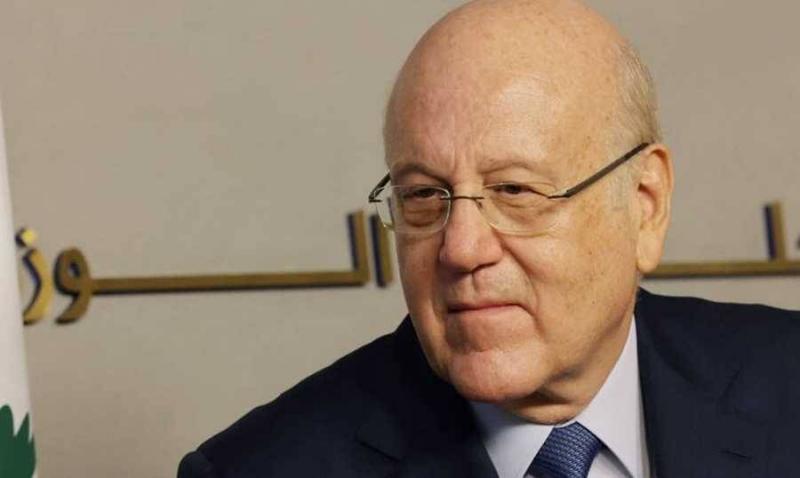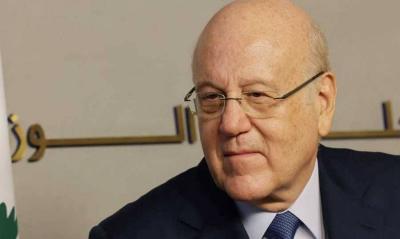The media office of Prime Minister Najib Mikati issued the following statement: "In response to what is being circulated regarding so-called 'hazardous materials' at the Zouk thermal plant, we wish to clarify the following: 1. On March 23, 2022, two days after receiving a letter from the Ministry of Interior and Municipalities dated March 21, 2022, regarding chemical material containers at the Zouk thermal plant, the President requested the matter be presented to the Council of Ministers, which decided to assign the Army to secure a guard point at the Zouk thermal plant immediately and to oversee the inspection of materials inside and outside the facility. Should these materials pose a public safety risk, necessary measures would be taken to prevent any harm and to ensure their transfer and removal promptly. 2. On March 24, 2022, based on the Cabinet's decision, the Ministry of National Defense indicated that the security forces bear the responsibility for guarding and are prepared to assist. It also stated that the Internal Security Forces had previously inspected the materials in the facility, reorganized and stored them safely according to their properties, segregated unusable materials for disposal, assured the absence of ammonium nitrate, and established safety standards within the warehouses. The engineering regiment was tasked with supervising the packaging, transfer, and storage at one of the oil facilities in the northern region upon a request from Electricité du Liban and in coordination with it, but the latter did not comply with the request until today. 3. Following a letter from the Ministry of National Defense dated April 7, 2022, the General Secretariat of the Council of Ministers sent a letter to the Ministry of Energy and Water - Electricité du Liban, requesting it expedite the required actions. In its response letter dated August 29, 2022, it clarified that, based on the statement from the German company Combilift, the materials are in a stable condition and have been stored and packaged in a manner that no longer poses any threat to public safety and health around the plant. However, the General Directorate of Oil refused to transfer them to its facilities. 4. On October 31, 2023, the public prosecutor submitted a report to the Court of Cassation and the Ministries of Energy and Water, and Environment, prepared by the Information Division of the Internal Security Forces on October 27, 2023, regarding the inspection of chemical storage at the Zouk thermal plant. The report requested approval for one or more specialized companies to export the chemical materials detailed in the report or dispose of them properly. 5. Following the Attorney General's letter, the General Secretariat of the Council of Ministers sent over 23 letters to the Ministry of Energy and Water, the Ministry of Environment, the Ministry of National Defense, the Ministry of Finance, the Ministry of Interior and Municipalities, and the National Council for Scientific Research - Lebanese Atomic Energy Commission, concerning this matter to take the necessary measures to ensure public safety. 6. On December 27, 2023, Electricité du Liban reported the following: - Regarding security at the plant, the protection and prevention department is doing its utmost to ensure the safety of the plant and its facilities through night patrols and during the day as well. - Hydrogen containers are placed in a room, interconnected technically; transporting and unpacking them is very complex and difficult. It should be noted that the old hydrogen production station adjacent to the new one is electrically isolated and its storage containers are empty. - The quantity of hydrochloric acid present at the plant is around 350 kg and is necessary for the operation of the plant. It is stored securely in a designated storage area created with the approval and supervision of the Lebanese Army, which has been inspected by security agencies several times. It meets the required specifications for protecting this substance, and the quantity is stored in a single container that cannot be transported without special equipment. - As for the necessary procedures for exporting chemical materials such as TriSodium Phosphate and Disodium Triosilicate, which have been expired for approximately 10 years, Electricité du Liban signed a contract with Tecmo s.a.l, representing Combilift, on March 30, 2021, for packaging and transporting the materials from the plant for disposal abroad. The institution transferred ownership of these materials to this company so that they could carry out the necessary transactions with all relevant entities. According to available information, the delay in transporting the chemical materials from the plant is due to a delay in obtaining the necessary approval from the Ministry of Environment. - Regarding the chemical materials (other than those required to be exported and disposed of) that are necessary for the operation and maintenance of the units, they are well-packaged and stored in warehouses, supervised by the Information Division, which inspects them regularly. 7. On April 23, 2024, a document from the General Directorate of State Security No. 44 included information about a patrol from the General Directorate of State Security that conducted a tour of the Zouk thermal plant on March 26, 2024, to verify the presence of hazardous chemical materials that could explode. Both the plant manager and the maintenance department head confirmed that the chemical materials "TRISODIUM PHOSPHATE" and "DISODIUM TRIOXOSILICATE" are not hazardous, are expired for about 10 years, and are packaged and ready for export. Hydrochloric acid is also present and is safely isolated within a designated storage area licensed by the Ministry of National Defense. 8. The Ministry of Environment stated that it is the responsibility of Electricité du Liban to take all necessary actions to dispose of the chemical materials environmentally soundly in accordance with the relevant legal texts, particularly adhering to the provisions of the Basel Convention on the control of transboundary movements of hazardous wastes and their disposal, as there is a lack of infrastructure in Lebanon for the environmentally sound treatment of these chemical wastes. Therefore, if the institution wants to export these wastes abroad for proper environmentally sound processing, it must submit an export file to the Ministry of Environment that includes the information and documents required in Annexes V (A) and (B) of the Basel Convention regarding the control of transboundary movements of hazardous wastes and their disposal. 9. On May 28, 2024, the Ministry of Finance confirmed that its role is limited to securing the necessary funds for transporting or disposing of these hazardous materials after the relevant administrations determine who will carry out this task and assign them according to the required protocols, and it confirms that it will secure the funds as quickly as possible.
In summary, it is evident that the chemical materials present at the Zouk thermal plant, based on the official reports from the relevant authorities and under their responsibility, are in a stable condition and have been stored and packaged well. They are regularly inspected and therefore do not pose any danger to public safety and health surrounding the plant, contrary to media reports. The procedures for exporting TriSodium Phosphate and Disodium Triosilicate by a specialized company must comply with Law No. 387 (ratifying the Basel Convention on the control of transboundary movements of hazardous wastes and their disposal) and Decree No. 5606 (defining hazardous waste procedures), as the waste producer or waste owner (i.e., the Ministry of Energy - Electricité du Liban) is responsible for taking necessary actions to dispose of the chemical materials in an environmentally sound manner and in accordance with the aforementioned laws and to refer to the Ministry of Environment for approval of their export according to the protocols, knowing that the latter is still waiting for the Ministry of Energy and Water (Electricité du Liban) to provide it with the complete export file and the necessary documents, which have not been received so far. In any case, the Prime Minister requested the General Secretariat of the Council of Ministers to place this matter on the agenda of the upcoming Council of Ministers session to clarify the situation and prevent any exploitation of the issue."




